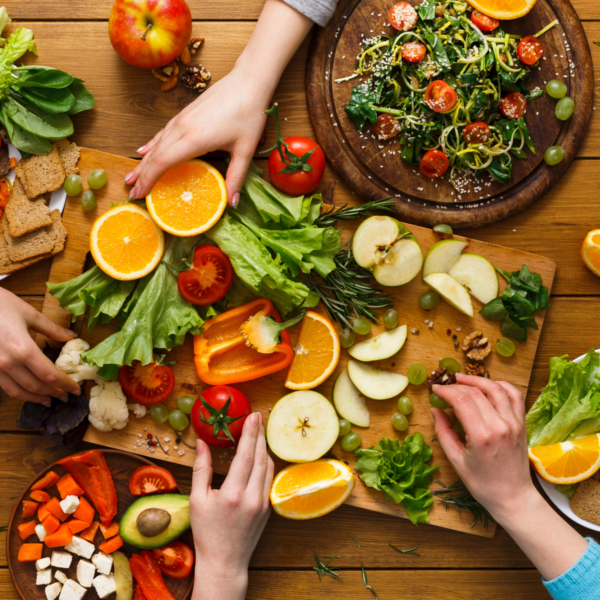There’s a lot of chatter in the health world about inflammation being bad for you. But sorting out what inflammation actually can be confusing.
If you think of inflammation as the swelling and redness that appears when you stub your toe, you’re correct. But that’s actually acute inflammation — a good kind of inflammation that your body uses to protect and heal itself from an injury or infection.
The other kind of inflammation keeps your body in a constant, low-level state of stress, kind of like a smoldering fire. This chronic inflammation may eventually damage cells and lead to disease.
Lots of factors can contribute to chronic inflammation, including food and drink, environmental toxins, lack of sleep, and stress.
And guess what else is linked to chronic inflammation in women? Menopause.
The link between inflammation and menopause
The ramping up of inflammation during perimenopause and menopause isn’t obvious, as our bodies don’t shout, “Hey, I’m feeling really inflamed today.” Instead, the pro-inflammatory state can slowly sneak up on you as your hormones decline.
Estrogen and progesterone can be considered anti-inflammatory hormones. During a woman’s younger years, abundant estrogen and progesterone suppress the body’s production of pro-inflammatory chemicals called cytokines. But as both hormones tend to drop during perimenopause and menopause, that protection against inflammation often declines. Without the sex hormones to suppress them, cytokine levels rise, which can drive chronic inflammation.
Chronic inflammation may cause many of the same symptoms women experience during menopause, such as skin issues, joint and muscle aches, brain fog, and weight gain around the middle. Chronic inflammatory states can even be linked to diseases like certain cancers, heart disease, and type 2 diabetes.
How we take care of our bodies during perimenopause and menopause can make a difference in how we feel and may even help prevent inflammation-driven diseases. Strategies such as getting enough sleep, exercising, and starting hormone replacement therapy are potential ways to relieve stress and may help quell inflammation.
Fight inflammation with your fork
Another essential weapon in the battle against inflammation is diet, because foods can either trigger or soothe inflammation in your body.
When foods are heavily processed, they’re no longer beneficial to our bodies and can contribute to inflammation. Try to limit or avoid unhealthy products like these:
- Processed meats, such as bacon, sausage, and bologna
- Baked goods, like cookies, pies, and cakes
- Processed snacks, such as chips and crackers
- Refined carbs, like white bread, pasta, and flour tortillas
- Fast foods and other fried foods
- Sugary foods and drinks, like candy and soda
The best anti-inflammatory foods
The foods that nourish your body at any stage of life are the same ones that help soothe inflammation — whole foods that are as close to the way nature made them as possible. You can feel good about fueling up with fruits, veggies, beans, nuts, seeds, whole grains, lean meats, and healthy fats.
Below are some examples of anti-inflammatory foods:
- Fruits: berries, citrus, apples, peaches, melons, dates, pineapples, grapes, bananas
- Non-starchy vegetables: leafy greens, bell peppers, summer squash, mushrooms, asparagus, broccoli, cauliflower, tomatoes, cucumbers, celery, beets, eggplant
- Starchy vegetables: sweet potatoes, carrots, potatoes, turnips
- Beans and legumes: lentils, chick peas, black beans, split peas, pinto beans
- Nuts: walnuts, pecans, almonds, pistachios
- Seeds: chia, pumpkin, sunflower, flax
- Whole grains: oatmeal, rice, quinoa
- Lean proteins: poultry, fish, eggs, 100% grass-fed beef
- Healthy fats: extra-virgin olive oil, avocados, nut butters
- Coffee and tea
- Spices and herbs: ginger, cinnamon, turmeric, rosemary, basil, parsley, cilantro
- Dark chocolate (70% or higher cacao)
Did you notice that many of those foods are plant-based? Research shows that eating a variety of healthy plant foods is associated with lower body-wide inflammation levels. That may be because colorful plant foods contain antioxidants — like polyphenols, flavonoids, anthocyanins, and vitamin C — which help calm inflammation.
For a variety of antioxidants, challenge yourself to eat 2-3 different colors of vegetables and fruits at each meal. Enjoying nutritious foods that fight menopausal inflammation is a gift you can give yourself every day.
For many women, adjusting diet alone may not be enough. Replenishing hormones with anti-inflammatory properties, like estradiol, progesterone, or oxytocin, can be an important option to consider during menopause. Talk with your provider about bioidentical hormone replacement therapy, which Belmar custom compounds based on your needs.
References:
- Pahwa R, Goyal A, Jialal I. Chronic Inflammation. StatPearls Publishing. Last updated August 7, 2023. Accesssed October 31, 2024.
- Fedotcheva TA, Fedotcheva NI, Shimanovsky NL. Progesteron as an anti-inflmmatory drug and immunomodulator: new aspects in hormonal regulation of the inflammation. Biomolecules. 2022;12(9):1299. doi: 10.3390/biom12091299
- McCarthy M, Raval AP. The peri-menopause in a woman’s life: a systemic inflammatory phase that enables later neurodegenerative disease. J Neuroinflammation. 17, 317 (2020). https://doi.org/10.1186/s12974-020-01998-9
- Malutan AM, Dan M, Nicolae C, Carmen M. Proinflammatory and anti-inflammatory cytokine changes related to menopause. Prz Menopauzalny. 2014 Jun 30;13(3):162–168. doi: 10.5114/pm.2014.43818
- Anti Inflammatory Diet. Johns Hopkins Medicine website. Accessed October 31, 2024. https://www.hopkinsmedicine.org/health/wellness-and-prevention/anti-inflammatory-diet
- Wang YB, Page AJ, Gill TK, Melaku YA. The association between diet quality, plant-based diets, systemic inflammation, and mortality risk: findings from NHANES. Eur J Nutr. 2023 Oct;62(7):2723-2737. doi: 10.1007/s00394-023-0319-z
- Tsigalou C, Konstantinidis T, Paraschaki A, et al. Mediterranean diet as a tool to combat inflammation and chronic disease. An overview. Biomedicines. 2020;8(7):201. doi: 10.3390/biomedicines8070201
- Best foods with anti inflammatory properties. Nutritious Life website. Accessed October 31, 2024. https://nutritiouslife.com/eat-empowered/best-foods-anti-inflammatory-properties/


